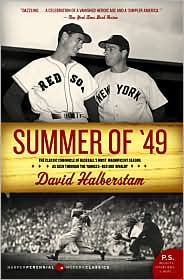
One night McDermott came back to the hotel about 4 a.m. and, to his consternation, ran into the manager. "Are you drunk again, McDermott?" Stengel asked. McDermott, fearing that this was the end, nodded that indeed he was. "Me too," said Stengel. "Good-night, Maurice."
This was a fantastic book. The vast majority of it was anecdotes; stories about the players, the writers, the owners, the fans really gave you a sense of the personalities of the time and the culture of the game. Through the endless stories, which often were pretty amusing, Halbsertam tells the story of an amazing pennant race. A few things struck me as interesting:
- The players did not mess around on or off the field. It was not at all uncommon for them to stay out drinking and chasing women until the wee hours (see the opening quote) and then go play the next day and play well. Some of them couldn't play well unless they had gotten plastered the night before.
- The relationship between the players and the sportswriters was vastly different then than it is now. The writers all knew about how boorish the players were and a lot of times partied with them, but they didn't write embarrassing things about them. What happened on the field was the important thing and they let the players be with their off field stuff. In some ways I think that's the way it should be. Sure, if someone takes steroids or tips pitches, that's something that should be exposed. But if some guy is just an ass or cheats on his wife or something, why is it so important to disillusion every 8 year old who worships him and thinks he's an example of everything that a good person is supposed to be? I'm just saying. They also didn't freak out about impartiality the way they do now. Today if you got a meal from a team you'd be in some serious trouble, but back then the teams always fed and transported the writers and probably did more than that. No one worried about it.
- Apparently the Yankees have always had owners who were total asshats.
- It's also crazy to think about these guys taking two or four years off right in the middle of their prime to go fight World War frickin II.
"You know what, Mama," he said to her. "They're playing for real money now. Some of those old boys" - he motioned toward the television set - "are making on hundred thousand dollars a year." "Ellis!" she said, as if catching him once again in some terrible exaggeration. "No, it's true, Mama," he said. "And what's more, in just a few years they'll all be making a million dollars." "Ellis!" she said, as if afraid some higher authority would strike him down for such a blasphemous idea. "A million dollars," he said. "All we played for, Mama, was love."

1 comment:
Haha! Asshats.
Post a Comment